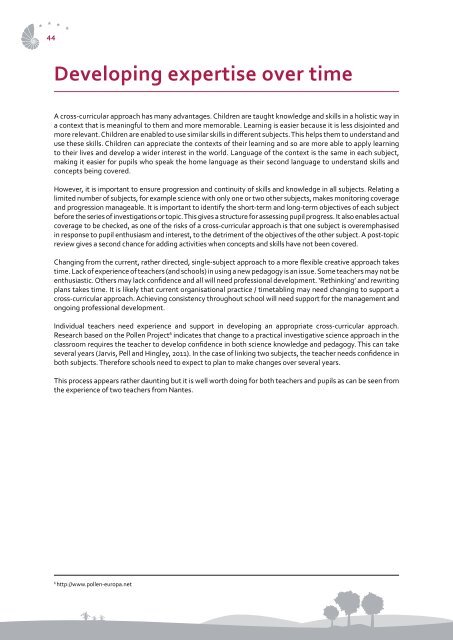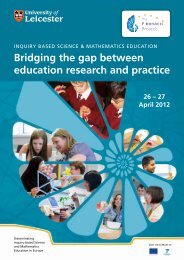Integrating Science Inquiry Across the Curriculum - Fibonacci-Project
Integrating Science Inquiry Across the Curriculum - Fibonacci-Project
Integrating Science Inquiry Across the Curriculum - Fibonacci-Project
Create successful ePaper yourself
Turn your PDF publications into a flip-book with our unique Google optimized e-Paper software.
44<br />
Developing expertise over time<br />
A cross-curricular approach has many advantages. Children are taught knowledge and skills in a holistic way in<br />
a context that is meaningful to <strong>the</strong>m and more memorable. Learning is easier because it is less disjointed and<br />
more relevant. Children are enabled to use similar skills in different subjects. This helps <strong>the</strong>m to understand and<br />
use <strong>the</strong>se skills. Children can appreciate <strong>the</strong> contexts of <strong>the</strong>ir learning and so are more able to apply learning<br />
to <strong>the</strong>ir lives and develop a wider interest in <strong>the</strong> world. Language of <strong>the</strong> context is <strong>the</strong> same in each subject,<br />
making it easier for pupils who speak <strong>the</strong> home language as <strong>the</strong>ir second language to understand skills and<br />
concepts being covered.<br />
However, it is important to ensure progression and continuity of skills and knowledge in all subjects. Relating a<br />
limited number of subjects, for example science with only one or two o<strong>the</strong>r subjects, makes monitoring coverage<br />
and progression manageable. It is important to identify <strong>the</strong> short-term and long-term objectives of each subject<br />
before <strong>the</strong> series of investigations or topic. This gives a structure for assessing pupil progress. It also enables actual<br />
coverage to be checked, as one of <strong>the</strong> risks of a cross-curricular approach is that one subject is overemphasised<br />
in response to pupil enthusiasm and interest, to <strong>the</strong> detriment of <strong>the</strong> objectives of <strong>the</strong> o<strong>the</strong>r subject. A post-topic<br />
review gives a second chance for adding activities when concepts and skills have not been covered.<br />
Changing from <strong>the</strong> current, ra<strong>the</strong>r directed, single-subject approach to a more flexible creative approach takes<br />
time. Lack of experience of teachers (and schools) in using a new pedagogy is an issue. Some teachers may not be<br />
enthusiastic. O<strong>the</strong>rs may lack confidence and all will need professional development. ‘Rethinking’ and rewriting<br />
plans takes time. It is likely that current organisational practice / timetabling may need changing to support a<br />
cross-curricular approach. Achieving consistency throughout school will need support for <strong>the</strong> management and<br />
ongoing professional development.<br />
Individual teachers need experience and support in developing an appropriate cross-curricular approach.<br />
Research based on <strong>the</strong> Pollen <strong>Project</strong> 6 indicates that change to a practical investigative science approach in <strong>the</strong><br />
classroom requires <strong>the</strong> teacher to develop confidence in both science knowledge and pedagogy. This can take<br />
several years (Jarvis, Pell and Hingley, 2011). In <strong>the</strong> case of linking two subjects, <strong>the</strong> teacher needs confidence in<br />
both subjects. Therefore schools need to expect to plan to make changes over several years.<br />
This process appears ra<strong>the</strong>r daunting but it is well worth doing for both teachers and pupils as can be seen from<br />
<strong>the</strong> experience of two teachers from Nantes.<br />
6<br />
http://www.pollen-europa.net




